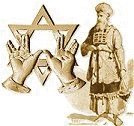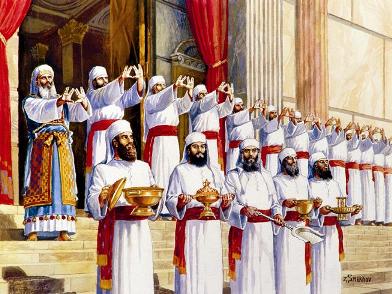|
ברכת כהנים; "Birkat Kohanim; The Priestly Blessing"
The literalness of this translation obscures the force of the Citerew and fails to convey the court imagery of the biblical idiom. In biblical idiom the king shows favor (the verb ḥanan) to his subjects by giving them audience, access to "the light of His face," whereas his disfavor is expressed by "hiding" his face from them. The third verse of the benediction presents a problem, for the king never "lifts up his face upon" his subjects as a token of favor: "to lift one's own face" means "to look up" (II Kings 9:32), and it is rather the recipient of favor whose "face is lifted up" (who is nesu panim by the one who shows favor, see II Kings 3:14; Job 42:8, 9). In the blessing, however, the idea seems to be that of raising the features in a smile, the opposite of dropping them in a frown (cf. lo appil panai ba-khem; lit. "I will not drop my face against you," Jeremiah 3:12; Genesis. 4:5–6; Job 29:24). Finally, favor is a good deal more than the mere absence of hostility; consequently not just "peace" but friendship is what shalom means here, as in Judges 4:17 and in beriti shalom (Numbers 25:12), and berit shelomi (Isaiah 54:10), both of which mean "my covenant/promise of friendship." If one further assumes that a ו (vav) has been omitted at the end of שָׁלוֹם before the ו (vav) at the beginning of וְ יָשֵׂם לְךָ שְׁלוֹמוֹ, וְשָׂמוּ will mean the exact opposite of אָסַפְתִּי אֶת שְׁלוֹמִי מֵאֵת הָעָם הַזֶּה ("I have withdrawn my friendship from that people"; Jeremiah 16:5). With this small change, the rendering of Numbers 6:24–26 in the Jewish Publication Society's translation of the Pentateuch (1962) is reproduced below in order to bring out the synonymy of the verses:
The L-rd {will} bless you and keep you!
The structure of this threefold blessing is interesting to note: the first sentence contains three words, the second five words, and the third seven words. The name of the Deity (*Tetragrammaton) is found in the second word of each sentence. |
|
May the L-rd (YHVH) bless you and guard you - יְבָרֶכְךָ יהוה, וְיִשְׁמְרֶךָ ("Yebhārēkh-khā Adhōnāy weyishmerēkhā ...) May the L-rd make His face shed light upon you and be gracious unto you - יָאֵר יהוה פָּנָיו אֵלֶיךָ, וִיחֻנֶּךָּ ("Yāʾēr Adhōnāy pānāw ēlekhā wiḥunnékkā ...) May the L-rd lift up His face unto you and give you peace - יִשָּׂא יהוה פָּנָיו אֵלֶיךָ, וְיָשֵׂם לְךָ שָׁלוֹם ("Yissā Adhōnāy pānāw ēlekhā wiyāsēm lekhā shālōm.") |
|
È Click on turning Music-note to receive YHVH's blessing for you!!
Speak to Aaron and his sons saying, In this way you will bless the children of Israel, Saying to them, The L-rd will bless you and He will keep you; The L-rd will make His face to shine upon you and He will be gracious to you; The L-rd will lift up His countenance to you and He will establish Shalom* for you And they will put My name upon the children of Israel, and I will bless them. (Numbers 6:23-27 One New Man Bible) (1 Chronicles 23:13).
(*Shalom mean far more than just only "peace"; click on Shalom to discover the riches of YHVH's blessing!)
Say to Aaron and his sons, This is the way you shall bless the Israelites. Say to them, The L-rd bless you and watch, guard, {and} keep you; The L-rd make His face to shine upon {and} enlighten you and be gracious (kind, merciful, and giving favor) to you; The L-rd lift up His [approving] countenance upon you and give you peace (tranquility of heart and life continually). And they shall put My name upon the Israelites, and I will bless them. (Numbers 6:23-27
Amplified) |
| Receive your Priestly Blessing by Psalmist Micha'el Ben David's |
|
"In unison when the Shofarers and the singers were to make themselves heard with one voice to praise and to glorify the L-rd, and when they lifted up their voice accompanied by Shofars and cymbals and instruments of music, and when they praised the L-rd saying, 'He indeed is good for His loving-kindness is everlasting,' then the house of the L-rd, was filled with a cloud..." (2 Chronicles 5:13) |
|
ברכת כהנים; "Birkat Kohanim; The Priestly Blessing"...Explained
There is a major difference between prayer and a blessing, Although the two are related, they are not the same. The Hebrew for blessing is beracheh, a word which shares its roots with l'havrich, meaning to "join" or "to intertwine". When a blessing is bestowed, what is accomplished is the joining of the source of blessing above with the person below. In effect nothing new happens. The blessing merely activate the exciting source of the blessing above and reveals it below. By contrast, prayer awakens a new will. When people are ill and when we pray for them, we recognize that there was a previous Divine will which brought about the illness, but we ask that now a new will should arise and bring health and revealed goodness. Each have their merits. The blessing suggest a certain measure of guarantee, in that it unveils that which is there, albeit in concealed in potential. Prayer suggest no guarantee, but it has the power to create a new reality.
The Priestly Blessing (Hebrew: ברכת כהנים; translit: "birkat kohanim"), is unusual it that it contains both of these elements. It is a traditional blessing, arousing the above to manifest below, yet is recited in the context of prayer, which gives the blessing an additional boon.
The power of the Priestly Blessing is to arouse new create new realities and bring them forth in the hastiest of ways. The reason Priestly Blessing can do so is because it does not originate with the priest, who after all is a finite, limited man-rather, it originate with G-d, The Priestly Blessing is a mitzvah, a Divine mandate, and as such its power is infinite and unrestricted. Not encumbered by the limitation of blessing in general, the Priestly Blessing can reach above and awaken the highest and newest Divine desires so that their effect is felt immediately below.
When priest, who act as the conduits for Divine desires flow, pronounce the words of the Priestly Blessing with love, as commanded by the Torah, the Divine presence rests on them. This is an opportune time for us to sweeten and annul all negative dreams and reinforce all the positive ones. The Priestly Blessing would always be pronounced by the Kohanim (Or HaChaim) Only G-d can ensure people of success, abundance and happiness. |
|
The First Blessing -
May HaShem bless you... Though it is clear that in the Divine scheme and in Israel's aspirations such material benefits are secondary to spiritual success, nevertheless if there is no flour there is no Torah (Amos 3:15) G-d blesses Israel with prosperity to enable the people to devote themselves to Torah study and fulfillment. |
|
The Second Blessing -
May HaShem illuminate... This refer to the light of the Torah, as we find in (Proverbs 6:23) For the commandment is a lamp and the Torah is a light. May G-d enlighten you so that you will be capable of perceiving the wondrous wisdom of the Torah and of G-d's intricate creation. ...And be gracious to you. May He cause you to find favor in His eyes of others. By granting you you Torah knowledge {Scripture}, as ell as the wisdom & understanding to utilize it properly and fully. With this blessing, the Kohanim pray that after giving Israel material and spiritual success, G-d will enable the other {Gentle Nations} to evaluate Israel properly! |
|
|
Peace is not simply
absence of war.
It is a harmony between conflicting forces. Within man, it is the proper balance between the needs of the body and his higher duty to the soul. In the universe it is balance between the infinite elements as well as between the Holy and the mundane. When Ancient Israel is sinful, it disrupts this balance, because it is not making proper use of human and physical recourses G-d gives the world. This create a barrier between G-d and His people, a barrier that G-d with compassion, removes so that we can repent and return to the blessed condition of peaceful harmony. |
This page is a part
of:
This
page of “Priestly
Blessing””
This web-pages has
been created &
Edited
© by:
Paulus van Beek
Graphic Design
Information source also out of:
Dake's Annotated Reference Bible.
(http://www.dake.com/index.shtml
)
(Scripture -
KJV)
Comprehensive Commentary Commentary Application Study Bible
Amplified Bible;
Orthodox Jewish
Bible;
The Chumash {Stone version; Hebrew/English}
Machzor for Rosh Hashanah; Page 159a
{Partly} Lubavitch Chassdic Prayerbooks Corp.
One New Man Bible
http://ojb.scripturetext.com/numbers/6.htm
Other related sources:
Hebrew for Christians:
http://www.hebrew4christians.com/Blessings/Synagogue_Blessings/Priestly_Blessing/priestly_blessing.html
Jewish Virtual Library
http://www.jewishvirtuallibrary.org/jsource/judaica/ejud_0002_0016_0_16089.html
Picture-source out "
God’s
Outreach Ministry
Int. Inc. ©
Research Center
End Time Harvest
Revival
P. O. Box 93404; Lakeland; Florida; 33804-3404
(863) 660-2444
Contact us
for information to the Editor/Web-designer
www.Endtimeharvestrevival.org
Picture-source
with permission:
My appreciation to all the artist known or not
known for their awesome illustrations
NOT ALL
illustrations are from the same source! Please
Contact us
for more info concerning
©-Rights:
©
Please respect the copy-rights! (Illustrations are edited)





 The Priestly Blessing or Priestly Benediction, (Hebrew:
The Priestly Blessing or Priestly Benediction, (Hebrew: 